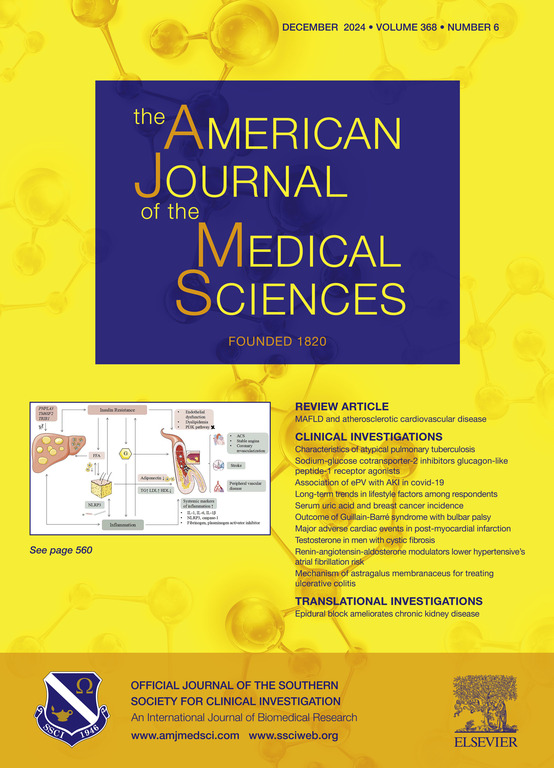TPOAb indicates neuroendocrine tumor in autoimmune gastritis: A retrospective study of 91 patients
IF 2.3
4区 医学
Q2 MEDICINE, GENERAL & INTERNAL
引用次数: 0
Abstract
Background
The association between serological indexes and occurrence of complications in patients with autoimmune gastritis (AIG) remains unclear.
Methods
91 patients with AIG were recruited and their clinical information were collected. The differences between serological indexes and complications of AIG were analyzed. And potential biomarker for early prediction and diagnosis of AIG with complications was explored.
Results
AIG patients in our study was 58.12 ± 11.68 years old, containing 31 males and 60 females. G17 was elevated in 49 of 52; PGI/II decreased in 43/49; GPA positive in 48/61; Anemia presented 28 in 80; Vitamin B12 deficiency occurred 23 in 58. Neuroendocrine tumor (NET) was the most common complication in AIG patients, accounting for 27/91. The second was polyps, making up for 14/91. There is also 9/91 of gastric mucosa neoplasia happened in AIG. No significant difference of G7, PGI, PGII, PGI/II and VB12 in AIG was found in different gastric mucosal lesions (P > 0.05). However, AIG patients with TPOAb positive had a higher risk in the occurrence of NET simultaneously (P = 0.0212). Those AIG with NET patients exhibited a significantly higher TPOAb level (P = 0.0078). ROC curve suggested that TPOAb can predict the existence of NET in AIG (AUC = 0.7410, P < 0.05).
Conclusion
We found that TPOAb can serve as a predictive biomarker of NET in AIG. This accessible test is helpful for endoscopy specialists to pay attention to gastric mucosal lesions in TPOAb-positive AIG patients, improving early diagnosis and intervention of comorbidities ability.
自身免疫性胃炎患者神经内分泌肿瘤的 TPOAb 指标:对 91 例患者的回顾性研究
背景:方法:招募了91名自身免疫性胃炎(AIG)患者,并收集了他们的临床信息。分析血清学指标与 AIG 并发症之间的差异。分析血清学指标与 AIG 并发症之间的差异,探讨早期预测和诊断 AIG 并发症的潜在生物标志物:我们研究的 AIG 患者年龄为(58.12±11.68)岁,其中男性 31 人,女性 60 人。52例中有49例G17升高;43/49例PGI/II降低;48/61例GPA阳性;80例中有28例贫血;58例中有23例维生素B12缺乏。神经内分泌肿瘤(NET)是 AIG 患者最常见的并发症,占 27/91 例。其次是息肉,占 14/91。此外,有 9/91 的胃粘膜肿瘤发生在 AIG 患者身上。在不同的胃粘膜病变中,AIG 患者的 G7、PGI、PGII、PGI/II 和 VB12 均无明显差异(P > 0.05)。然而,TPOAb 阳性的 AIG 患者同时发生 NET 的风险更高(P = 0.0212)。AIG合并NET患者的TPOAb水平明显更高(P = 0.0078)。ROC曲线显示,TPOAb可预测AIG中NET的存在(AUC = 0.7410,P < 0.05):结论:我们发现 TPOAb 可作为 AIG 中 NET 的预测性生物标志物。结论:我们发现TPOAb可作为AIG中NET的预测性生物标志物,这种简便易行的检测方法有助于内镜专家关注TPOAb阳性AIG患者的胃黏膜病变,提高早期诊断和干预合并症的能力。
本文章由计算机程序翻译,如有差异,请以英文原文为准。
求助全文
约1分钟内获得全文
求助全文
来源期刊
CiteScore
4.40
自引率
0.00%
发文量
303
审稿时长
1.5 months
期刊介绍:
The American Journal of The Medical Sciences (AJMS), founded in 1820, is the 2nd oldest medical journal in the United States. The AJMS is the official journal of the Southern Society for Clinical Investigation (SSCI). The SSCI is dedicated to the advancement of medical research and the exchange of knowledge, information and ideas. Its members are committed to mentoring future generations of medical investigators and promoting careers in academic medicine. The AJMS publishes, on a monthly basis, peer-reviewed articles in the field of internal medicine and its subspecialties, which include:
Original clinical and basic science investigations
Review articles
Online Images in the Medical Sciences
Special Features Include:
Patient-Centered Focused Reviews
History of Medicine
The Science of Medical Education.

 求助内容:
求助内容: 应助结果提醒方式:
应助结果提醒方式:


